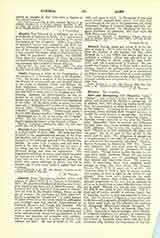www.catholic.com/encyclopedia/oliver-almond


Click to enlarge
Almond, OLIVER, priest and writer, b. in the diocese of Oxford. He is believed by Foley to have been the brother of the martyr, the Venerable John Almond (q.v.); but Gillow has shown that this is probably a mistake. Oliver was educated at the English Colleges at Rome (1582-87) and Valladolid, and was a missionary in England. He presented the English College at Rome with a precious chalice. Some of his correspondence is preserved in the “Westminster Archives”, and he is conjectured by Gillow to have been the writer of a work entitled, “The Uncasing of Heresies, or the Anatomie of Protestancie, written and composed by O. A.” (Louvain?) 1623, 8vo.
J. H. POLLEN
Enjoying this content? Please support our mission!Donatewww.catholic.com/support-us

